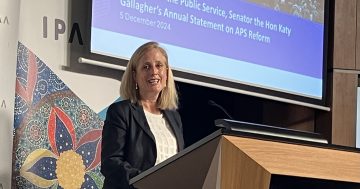
The Australian National Audit Office has severely criticised the Australian Public Service Commission. Photo: Michelle Kroll.
The public service entity charged with overseeing integrity in the sector doesn’t have a clear strategy or the right systems in place to promote and monitor the conduct and ethics of the workforce.
Nor has it properly evaluated decisions taken by public service leaders, even in light of the illegal Robodebt Scheme, allegations of cronyism, and the increased concerns over conflicts of interest in the APS.
The Australian Public Service Commission has been severely criticised in an evaluation by the Australian National Audit Office, which says that between July 2022 and December 2023 (the period of its audit), there was little of substance to promote the APS Code of Conduct.
It delivered its report of the audit on Friday (21 June)
“The APSC did not have a strategy, linked to outcomes which can be measured, for promoting the APS Values and Code of Conduct and its approach to this function was largely activity-driven,” the auditor’s scathing report states.
“While the APSC communicated integrity and ethical requirements and expectations through a variety of activities, including training and guidance, they were not guided by a risk-based strategy.
”APSC guidance was revised or new guidance issued to manage identified risks and issues, without reference to a forward engagement strategy.
“The APSC had limited arrangements in place to provide assurance to the sommissioner and parliament that it had effectively promoted the APS Values and Code of Conduct.
“The APSC did not have a sound basis for monitoring and evaluating the extent to which agencies incorporate and uphold the APS Values, or the adequacy of systems and procedures in agencies to ensure compliance with the Code of Conduct.
“There was no mechanism to provide assurance or insight to the commissioner or the parliament on agencies’ implementation of the APS Values and Code of Conduct.”
The Auditor-General found the APSC to be only partially effective in its administration of statutory functions relating to upholding high standards of integrity and ethical conduct in the APS during the audit review period.
The commission could not demonstrate or provide assurance on whether its activities relating to integrity functions were well-directed or fully effective.
“In the context of an operating environment focused on perceived shortcomings in APS integrity, the APSC was in the process of developing a more strategic approach,” the report states.
The audit recommends the APSC develop a strategy to document and guide its objectives and desired outcomes relating to its statutory function to “promote” the APS Values and Code of Conduct as set out in the Public Service Act 1999.
It also recommends the commission develop and implement an evaluation strategy for its integrity training to determine if its suite of integrity training is achieving the intended outcomes.
It should review record-keeping arrangements for its governance committees and should develop an evaluation strategy to improve the level of assurance it gives to the Federal Parliament on how APS values are being upheld.
The APSC has agreed with the Auditor-General’s findings and vowed to implement all four of the report’s recommendations.
Commissioner Gordon de Brouwer has outlined improvements being made since the audit’s period and has highlighted ongoing initiatives being undertaken to bolster its stewardship over the service.
“The commission welcomes the observations of the ANAO in this report and agrees with the four recommendations and intent of the opportunities for improvement,” Dr de Brouwer wrote in response to the audit.
“These recommendations are timely given our ongoing program of work to strengthen the articulation of our purpose, key activities, priorities and performance measures.
“In addition, actions to address these recommendations will dovetail with work arising from our Capability Review to enhance strategies and tools for data and stakeholder engagement, as well as corporate systems for governance, risk, information management and assurance.
“In our stewardship role, we will partner with the Attorney General’s Department to develop an enduring APS Integrity Strategy to articulate a clear narrative for integrity activities and reforms, and to clearly identify the role and actions all agencies and public servants are required to embrace to demonstrate excellence in integrity.
“In parallel, the commission will bring together its broad suite of integrity initiatives into an overarching integrity strategy, supporting impact and outcome-focussed evaluation to strengthen assurance over the performance of our legislated functions.”
Original Article published by Chris Johnson on Riotact.









